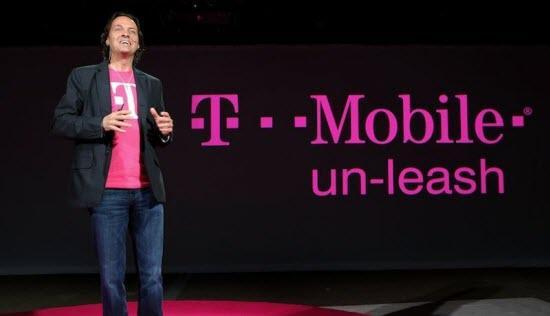
The men and women in magenta are closer than ever from cutting unsuspecting consumers free from conniving two-year commitments. With T-Mobile's recent announcement as the Uncarrier, the facade of your impenetrable commitment is nearing to an end, or so T-Mobile hopes, with the ditching of contracts entirely for all T-Mobile customers. T-Mobile CEO John Leger wants you to believe it's a simple choice when switching to his carrier, but in reality it's not.
T-Mobile has lacked long-term vision for quite a while. You could attribute it to the shoddy coverage in suburban areas, or the expansion of 4G LTE by the other carriers and T-Mobile's slow roll-out. However you cut it, they've been failing to garner the attention of customers bound to AT&T, Sprint, and Verizon.
T-Mobile has always been the disruptive upstart carrier in the States which is not a fresh approach at all, but they now have some unique firepower to counteract the competition. It's long overdue, if you ask me. In the past year, they've managed to rebrand themselves as edgier thanks to a leather-clad Carly Foulkes, the once sweet T-Mobile girl now turned bad. Their portfolio of devices is now one of the most diverse with offerings from all the major mobile operating systems including Windows Phone, the sole OS Sprint has failed to offer for a little over a year. They offer the Google Nexus 4. They will sell the HTC One and Samsung Galaxy S 4 at significantly lower prices than the competition. There will be no contractual commitment in the traditional sense of the two-year agreement on other carriers. They're even experimenting with an "anytime upgrade club" as outlined by my colleague, Anna.
In essence, T-Mobile is finally starting to disrupt the status quo. And I should reiterate on my previous statement; it's long overdue, and extremely admirable.
Between top-tier devices like the HTC Windows Phone 8X and the Samsung Galaxy S 3, BlackBerry Z10, and iPhone 5 all coming in at lower initial down payments than the competition, T-Mobile is well on their way to gathering attention.
But the Uncarrier's approach to contracts (or lack thereof) can only be as effective as its pricing. Based on the information provided by WhistleOut a "100% independent" startup aimed at "improving the decision making process in challenging product areas," T-Mobile significantly undermines AT&T, Sprint, and Verizon's contractual pricing. Pair T-Mobile's black and white $50, $60, and $70 unlimited talk and text with competitive data pricing, and it's a compelling alternative.

I know what you're thinking. Data coverage. It's a valid argument, but the choice is simple if you are in a T-Mobile covered area. You can find T-Mobile's most current coverage map here. For quite a while, I have questioned the viability of my carrier's download speeds. Whether at home or on the road, they have been less than desirable. Coverage, on the other hand, has been acceptable. The one problem with supreme coverage is the fact that I hardly use my smartphone to make phone calls. However ridiculous it may sound, I have learned the hard way with Sprint that data speeds are much more important to me than coverage. As the turn of 40Mbps download speeds have told us, call quality is only half the battle. This is a battle T-Mobile is fully embracing, and rightly so. To put it simply, T-Mobile has never been in a better position to market against the grain, and their HSPA+ network is finally coming to fruition.
Inevitably, T-Mobile has managed to attract just as much negative publicity as it has optimism since their T-Mobile Unleashed marketing ploy. Skeptics will remain skeptics. These are the same people who continue to justify constant coverage of Verizon's service while they remain stationary in their permanent abode. The same people who live in suburban areas that only offer 2G coverage. The same people who prefer to have consistent download speeds at all times, instead of realizing data connectivity is only as valuable as what you pay for it. The best part about the Uncarrier is the lack of commitment required, and the long-term promise that could be. It's a risk that you have very little vested interest in. As Leger says, "If we suck. Drop us."
Yet, as a smartphone user (and abuser), there is a certain lack of avail to T-Mobile's recent uprising with their inexperienced CEO John Leger at the wheel. Where we are going, he might not even know, but where he and his company could end up with a successful no-contract mentality is an enticing alternative, to say the least. It's radical. T-Mobile claims to cover 200 million people by the end of 2014. To top it off, their fallback data speeds nearly rival 4G LTE in some markets, so it's essentially a win-win scenario if you are ready to be a part of the company's $4 billion network upgrade.
It's been a long while since I've considered switching carriers, but T-Mobile may be onto something with their new endeavor as the Uncarrier. You can argue all you want as to why you won't test it out, but the truth of the matter is you are never expected to commit to them. If you have an unlocked GSM smartphone lying around, you have every reason to give the magenta carrier a try.
In essence, T-Mobile is the summer fling of the mobile carriers. They're wild and crazy and damn near wreckless compared to the competition, but with no commitment required, why not check her out?
Can the new T-Mobile make it in 2013?
Images via TheFullSignal and WhistleOut.